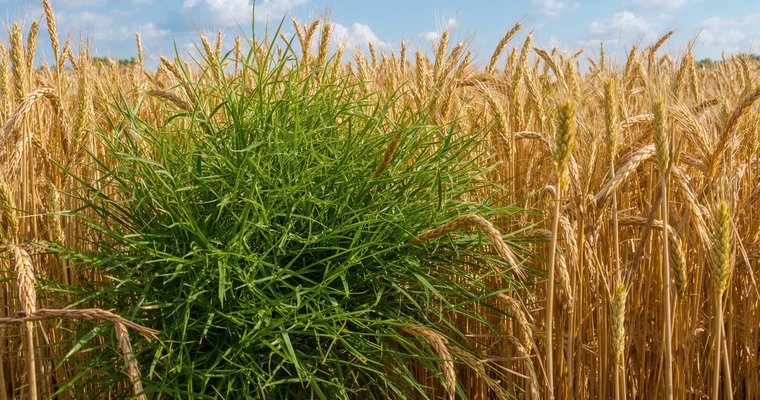Seeds and weeds
 Adobe
Adobe
God always follows certain kingdom principles in his work. You can count on it. If you want to experience maximum success in God's kingdom, you must discern what those principles are and then sync your life with them.
In Matthew 13:24-30, Jesus tells a story of a farmer who planted his field and was anticipating a great harvest. An enemy, seeking to harm him, secretly came and sowed bad seed throughout the same field. The farmer's servants were distraught when they realized what had happened. They wanted to uproot all the weeds. The farmer wisely instructed them to leave everything alone until harvest time. If they pulled out the weeds immediately, they would inadvertently destroy many good plants as well. Instead, they should let them grow together. When the harvest came, they could uproot both types of plant. They could collect the good grain in the barn and gather the weeds to be burned.
This parable offers wisdom for us today. We all struggle to control the "weeds" in our life. It's a painful reality of living in a fallen, sinful world. Perhaps a well-known preacher who has seen many people come to faith in Christ through his ministry holds some wonky views about the end times or the working of the Spirit. Maybe a politician is doing great things for his constituents but has some off-putting character quirks. Many people today are struggling to know how to respond in such situations.
Some people shrug their shoulders and claim, "No one's perfect!" They blindly support people who do things in an un-Christlike way. Others feel strongly that it's moral compromise to support anyone who fails to demonstrate proper beliefs and behavior. They loudly condemn those who fall short of their standard.
Like so much in life, it's wise to avoid extremes. Clearly, certain behaviors and attitudes must be unequivocally rejected and condemned. The problem, as the parable illustrates, is that there are many good people and movements that aren't perfect. If you reject someone because you don't fully agree with their politics, theology, or methodology, then you will also miss out on all the good they bring to the table.
I'm a historian. I love reading biographies of famous people. Something that quickly becomes clear is that every leader, no matter how successful, has feet of clay. Winston Churchill was a great leader during World War Two, but he wasn't a saint. Yet to reject him because of his character or moral failings would be to ignore the times when he got things spectacularly right. George Washington, Alexander Hamilton, Thomas Jefferson, and many other prominent people from history made enormous contributions to the world. But they were far from perfect human beings, and not all of their opinions had merit or were morally correct. If you only support people with whom you fully agree, your list will be quite short.
Jesus pointed out that weeds eventually become obvious. He didn't excuse them by saying, "Well, that's just the way weeds are," or "Who am I to judge, we allhave weeds in our life . . ." Jesus uncompromisingly condemned every form of weed, but he was also careful not to let them destroy the whole crop. The only thing worse than having bad seed is allowing it to destroy good seed.
In Jesus's parable, the farmer kept an eye on the bad seed, but he refused to let the weeds hinder the growth of the good seed. He let them cohabitate for a while. Eventually, the harvest arrived. When no damage could be done to the ripe grain, the weeds were collected and burned. A time will come when truth will prevail, and evil will be exposed and judged. Yet we should be careful not to sacrifice the good in our effort to condemn the bad.
We shouldn't be shocked if we discover weeds in leaders or groups of people. If we look closely in the mirror, we might find weeds in our life and beliefs too. Jesus was teaching discernment, not compromise. He practiced this approach with his twelve disciples. Each one had the potential to bear much fruit, but they had weeds in their lives too. He didn't reject them because of their faults. He invested in them because he knew a great harvest could result.
A day is coming when the weeds in our life will be consumed by flames. Much will be burned up and lost. Some organizations will discover that their work was mostly weeds. Yet there will be a harvest from the good that was accomplished. At the end of the day, only what was done for Christ according to his word will remain. All else will be consumed. Until that time, we must learn how to navigate our life through fields that contain both good and bad seed.
| Richard Blackaby is the president of Blackaby Ministries International and lives in Georgia. He travels internationally speaking on spiritual leadership in the home, church, and marketplace as well as on spiritual awakening, experiencing God, and the Christian life. Richard regularly ministers to Christian CEOs and business leaders. He has written or co-authored 33 books . This article was first published on RichardBlackaby.com. Used with permission from Blackaby Ministries International. Learn More » |
More on Spiritual Growth and Soul Care
- The power of story: why science and Scripture say it works 3x better (by Bob Whitesel)
- Loving others as Christ loved us (by Bob Russell)
- 7 new practices for a better new year (by Carey Nieuwhof)
- How traditional retirement takes the Lord’s name in vain (by Jordan Raynor)


